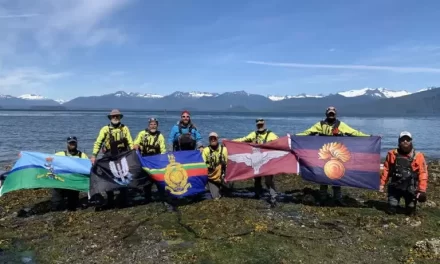
Fishermen will still be able to drive vehicles to the spot on the Chilkoot river during the hooligan run. (Abbey Collins)
A dispute in Haines between private landowners and several Native organizations has come to a close. The disagreement over drive-down access for hooligan fishing on the Chilkoot River was resolved by a judge last year. But that wasn’t the end of the legal battle. Now, the landowners in the case have been ordered to pay a significant amount of money to the other side.
“As a family for us it’s kind of just shocking and devastating,” says Rosalie Loewen. She and her husband Reuben own property along the Chilkoot River.
In 2013, they sought to protect a couple pieces of their land from anyone else claiming ownership through a process called ‘quiet title.’
Their land includes a path that local subsistence fishermen use to drive down to the river and fish for hooligan.
The Chilkoot Indian Association, Alaska Native Brotherhood Camp 5, and Sealaska Corporation intervened in the case. They wanted to fight for continued drive-down access. The path has historically been used to access the hooligan fishery, including the use of vehicles for many years. Fishermen said they need to drive down to the river to accommodate the elderly and to help haul fish back up.
There has been a conflict at the spot for several years.
In September, a judge decided that right should be preserved. Superior Court Judge Phillip Pallenberg ruled that although the land still belongs to the Loewens, they cannot block access during the few weeks of the hooligan run.
He said that is not the case for the other piece of land in question. That belongs to the Loewens and there is no public easement.
Lee Heinmiller, secretary of the Alaska Native Brotherhood Camp 5, says this case established a precedent for subsistence rights, and preserving access to traditional fishing sites.
At that point, the Loewens said in some ways the decision represented a good balance between their rights as private landowners and what’s important to the community. They said they were never opposed to fishing at the spot, just the use of vehicles.
But the case was not over.
“There have been several points where we thought, this can’t get any worse,” says Reuben Loewen. “This is it, it’s done, let’s move forward. And then they come back.”
“And it gets worse,” says Rosalie Loewen.
Last month, the judge ordered the Loewens to pay just over $52,000 in attorneys’ fees and costs.
Reimbursement will be distributed between the Chilkoot Indian Association and Sealaska. Sealaska footed most of the legal bill.
Kristen Miller is the lawyer that represented Sealaska in the case.
“I’m satisfied that the judge awarded some of the money that we expended to fight this fight,” said Miller. “It would have been nice if we were to receive more. But I think it was reasonably under the circumstances.”
In a civil case like this one, Alaska law allows the prevailing party to receive financial compensation from the losing side.
But the Native corporations didn’t prevail on all fronts. So, the judge only awarded $52,000 of the about $240,000 Sealaska and the other parties requested. Pallenberg granted that amount because he said they did succeed on the main issue: the right to preserve drive-down access to the river.
The Loewens were not expecting this outcome.
“It will definitely mean some big changes for us as a family,” said Rosalie. “I think we’ll be able to pay it without losing our land. And just even saying that makes me kind of want to cry – how did it get to that point?”
Money aside, Rosalie says they feel there is ‘ill-will’ toward their family. She says it’s difficult to see where they fit in the community now.
“We’ve come we’ve been good neighbors, good citizens. We’ve tried to be good people as we’ve become embroiled in this situation and tried to handle it in a way that was in everybody’s interests,” said Rosalie. “To have this be the outcome, it’s shocking and pretty devastating for us.”
Miller says her clients sought compensation because it was their right by Alaska law after the outcome of the case. She says they are glad they were able to protect subsistence rights to fish in that spot on the river in the same way local fishermen have for many years.
“We are satisfied,” said Miller. “Our goal in this litigation was to preserve the access that we’ve always had for generations. Unfortunately the Loewens tried to block that access and that’s why we had to fight.”
The Loewens say they are not going to appeal the judge’s decision.









Rosalie and family, the ill-will you may feel is not shared by everyone. You fought a regional “giant” by taking on Sealaska. That is not something folks get to do every day. Who knows what opportunities that experience could bring you. Hopefully the trash left behind after the fishing period ends, can be dealt with outside of court, and you folks can continue to be great people. The last chapter in this story will be to heal the rift between the stakeholders. Don’t forget that step or this story won’t end as soon as you’d like.